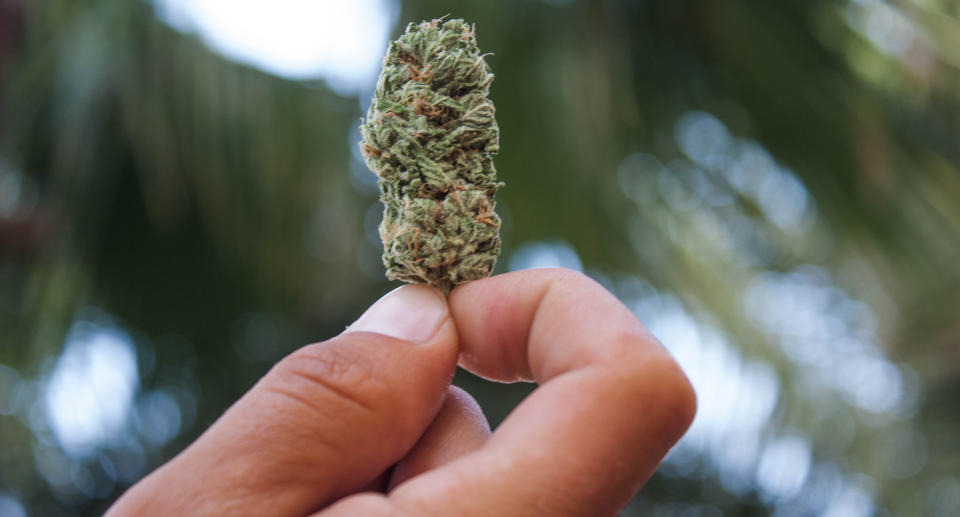What The Health?!: Doctors say man murdered his mother during 'cannabis induced psychosis'
Can leftover spaghetti really kill you? Can you actually cough up a blood clot in the shape of your lung? In Yahoo Lifestyle Canada‘s newest series, What The Health?!, we ask doctors to weigh in on odd health news stories and set the record straight. Be sure to check back every Friday for the latest.

A 30-year-old Edmonton man who stabbed his mother to death was likely experiencing cannabis-induced psychosis at the time, according to information released at a recent sentencing hearing.
Kathy Dickout, 53, died after being stabbed multiple times by her son, Jason, after an Easter family gathering in 2017.
The man and his sister had consumed cannabis on Easter Monday, according to an agreed statement of facts reported in the Edmonton Journal. The pair smoked “two inhalations of dried marijuana” that evening.
ALSO SEE: Keratosis pilaris: How to treat those 'chicken skin' red bumps on your arm
Around 10:30 pm., Jason helped his mother unload groceries when she returned home from shopping. A little while later, he began acting strangely. His sister later recalled he was screaming as if having night terrors, making animal noises and speaking nonsensically. To calm him down, his sister offered him some of her prescribed cannabis oil preparation, which he had never consumed before. He ingested about 1 millilitre of the oil.

Just after midnight, his sister called police to report “she had just witnessed her brother stabbing their mother repeatedly and that he appeared to be having some kind of psychotic break as he was screaming at the top of his lungs ‘like a crazy person.’”
When police arrived, the man was screaming and laughing, covered in blood. While en route to police headquarters, Jason continued to behave strangely, stating “This was all for a laugh,” and “I killed my mom. She was so beautiful. She was always thinking of me. I’m her son. She loves her son. Why?”
ALSO SEE: 'It's never too late to make changes': Jann Arden opens up about aging and sobriety
A subsequent mental health assessment found that marijuana consumption likely played a role in what happened.
The agreed statement of facts reads,“Dr. Alberto Choy and Dr. Andrew Haag each opined that, on a balance of probabilities, at the time of the stabbing, the accused was experiencing an acute cannabis-induced psychosis which was both self-induced and transient, with the symptoms abating with a couple of days.”
Jason Dickout was initially charged with second-degree murder and possession of a dangerous weapon but plead guilty to manslaughter. He’s expected to be sentenced next year.

Although the tragic case is an example of the way certain forms of cannabis can potentially affect someone, cannabis related psychosis is extremely rare and not well understood, says Zach Walsh, associate professor of psychology at the University of British Columbia—Okanagan.
Acute psychosis generally refers to a brief, time-limited experience of psychotic symptoms such as delusions, hallucinations and disorganized speech or behaviour. When these occur outside of a psychotic spectrum disorder such as schizophrenia it may be due to the use of medications, a medical condition, or use of other substances, such as amphetamines or alcohol. Stress can also induce psychosis.
ALSO SEE: What The Health?!: Can eating junk food really make you go blind?
“Cannabis-induced psychosis” is not a formal medical condition, but the term has been used to refer to a brief episode of psychosis in which it is hypothesized that cannabis use preceded it.
“Brief psychosis is a very mysterious thing,” Walsh says. “We really don’t know a whole lot about it. We know some of the things that can increase risk for it: there seems to be genetic risk; If you have relatives who have psychotic disorders. It’s more common in females than males. It usually happens a little bit later in life compared to schizophrenia. Part of the reason it’s so mysterious is because it’s quite rare.

“Most brief psychotic episodes resolve,” he says. “Cannabis can be a trigger, but so can a lot of other things. Something that is so rare [makes it] really hard to establish a pattern of risk….Having a cannabis-induced psychosis with such an awful, horrible outcome is like a lightning strike—very, very rare.”
The tragedy of this particular case notwithstanding, Walsh notes that the story could feed into alarmist, Reefer Madness-like thinking. The risk of acute psychosis induced by many commonly prescribed medications is substantially higher than by cannabis, but the prevailing stigma and fear around the substance has thrust this case into the spotlight.
ALSO SEE: Woman in semi-comatose state after using skin cream from Mexico
“This is a very tragic brief psychotic episode, but I don’t think it speaks loudly to the risks inherent for most people when using cannabis,” Walsh says.
Compared to other medications and recreational substances Walsh says cannabis is relatively safe. People who are at risk for psychosis (having first-degree relatives who have a psychotic disorder or those who have experienced psychotic-like symptoms in the past, for example) should be cautious using cannabis or abstain.
When it comes to safe use of cannabis, dosage is another factor that comes into play, Walsh says. Sourcing products from the illegal market makes it difficult to know the potency. It follows common sense that a higher dose is riskier than a lower dose. Legalization, he adds, will allow people to be more aware of the dosage they’re taking with more accurate labelling.
Let us know what you think by commenting below and tweeting @YahooStyleCA! Follow us on Twitter and Instagram.



